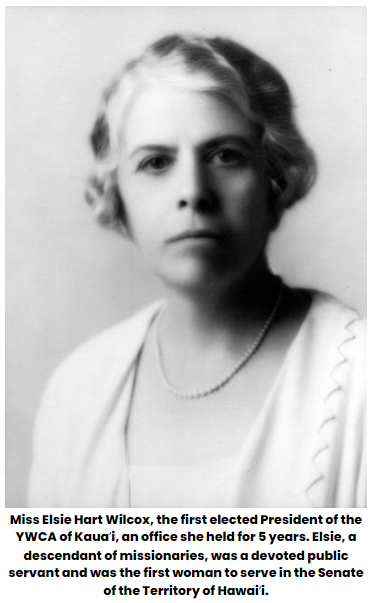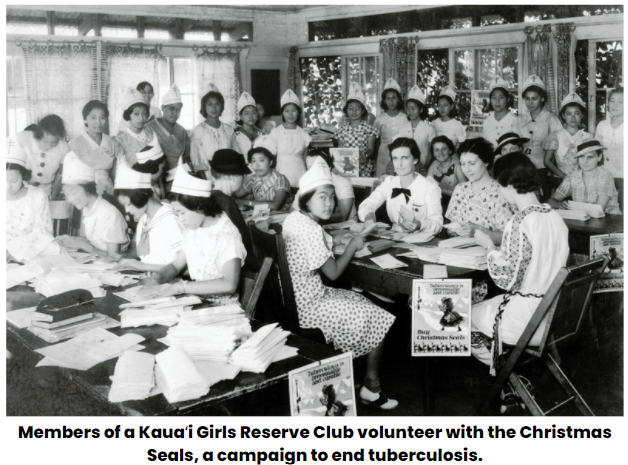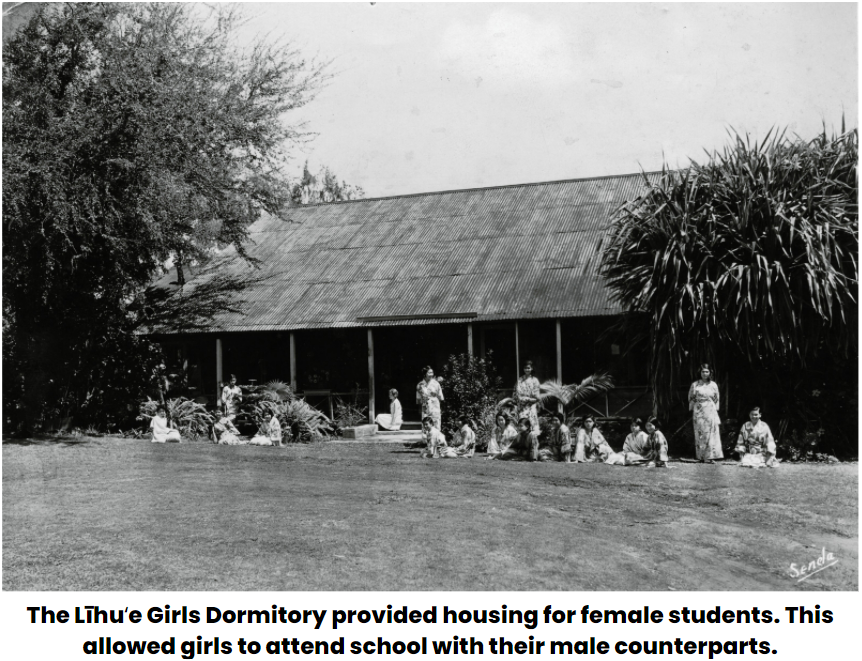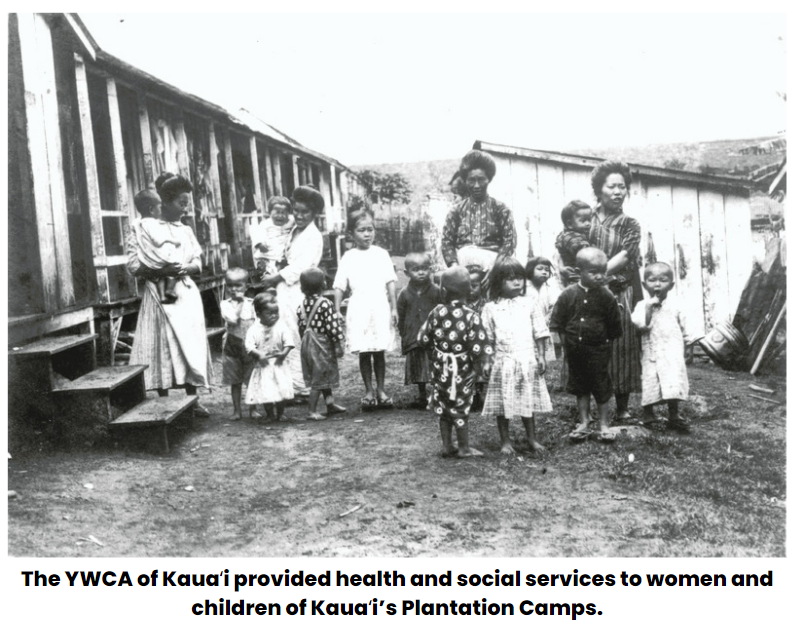Honoring Our History Means Acknowledging Our History
The YWCA of Kauaʻi recently celebrated 100 years of serving our island community. In our early history, our organization mobilized to provide social services to first and second-generation immigrant women and children of plantation camps, improved girls' access to education, and actively advocated for Japanese residents placed in internment camps. However, the need for these services at the time of our organization’s founding was a direct repercussion of colonialism and the illegal overthrow of the Hawaiian Kingdom. Cultural erasure, economic disparity, and environmental degradation have borne out the results of American colonialism in Hawaiʻi. Throughout the world, colonialism has left deep scars on indigenous peoples and lands, and this reality is no different in Hawaiʻi. The historical foundation of white control over Kauaʻi’s resources is strongly rooted at the turn of the 20th century. Christian missionaries discouraged and moved to outlaw Hawaiian cultural practices. Plantation barons displaced kānaka maoli (native Hawaiians) from their ‘āina (land), and used the labor of immigrants for their own monetary gain. This white hegemony continues today at the expense of indigenous peoples and other peoples of color. The Kingdom of Hawaiʻi considered health and education to be fundamental. In 1859, the country passed a law providing universal health care and by 1893 the Kingdom maintained a nearly universal literacy rate. In 1841, the Hawaiian Kingdom became the fifth country in the world to provide compulsory education for all youth; the United States began providing this service in 1918. However, following the American seizure of the Hawaiian government, a provisional government was installed and the insurgents renamed themselves the Republic of Hawaiʻi in 1894. In 1900, the U.S. Congress renamed the Territory to the State of Hawaiʻi by congressional act.Throughout Hawaiʻi, the Americanization Movement was pervasive and widely supported by the elite white community in the territory, citing the benefits of a homogenized labor force. As millions of immigrants made the United States their home at the turn of the 20th century, proponents of the Americanization Movement sought to “change the unskilled inefficient immigrant into the skilled worker and efficient citizen.”1 In Hawaiʻi, this manifested as English-only education, punishment for speaking the Hawaiian language, closures of Japanese schools, and the incorporation of patriotic activities throughout the school day as described by a document titled “Programme for Patriotic Exercises in the Public Schools” and published by the Territory of Hawaiʻi’s Department of Public Instruction. 2 The founding women of the YWCA of Kauaʻi were ahead of their time and true philanthropists. They endeavored to better and enrich the lives of women and girls from all walks of life in the community. Even so, it must be acknowledged that these early leaders were the descendants, relatives, and spouses of the missionary and plantation systems and were, therefore, the direct beneficiaries of these oppressive systems and oftentimes supporters of the Americanization movement. However, the early YWCA of Kauaʻi sought to bring supportive programming to women and girls from all ethnic, national, and religious backgrounds. Some of the YWCA of Kauaʻi’s early programs included:
The historical foundation of white control over Kauaʻi’s resources is strongly rooted at the turn of the 20th century. Christian missionaries discouraged and moved to outlaw Hawaiian cultural practices. Plantation barons displaced kānaka maoli (native Hawaiians) from their ‘āina (land), and used the labor of immigrants for their own monetary gain. This white hegemony continues today at the expense of indigenous peoples and other peoples of color. The Kingdom of Hawaiʻi considered health and education to be fundamental. In 1859, the country passed a law providing universal health care and by 1893 the Kingdom maintained a nearly universal literacy rate. In 1841, the Hawaiian Kingdom became the fifth country in the world to provide compulsory education for all youth; the United States began providing this service in 1918. However, following the American seizure of the Hawaiian government, a provisional government was installed and the insurgents renamed themselves the Republic of Hawaiʻi in 1894. In 1900, the U.S. Congress renamed the Territory to the State of Hawaiʻi by congressional act.Throughout Hawaiʻi, the Americanization Movement was pervasive and widely supported by the elite white community in the territory, citing the benefits of a homogenized labor force. As millions of immigrants made the United States their home at the turn of the 20th century, proponents of the Americanization Movement sought to “change the unskilled inefficient immigrant into the skilled worker and efficient citizen.”1 In Hawaiʻi, this manifested as English-only education, punishment for speaking the Hawaiian language, closures of Japanese schools, and the incorporation of patriotic activities throughout the school day as described by a document titled “Programme for Patriotic Exercises in the Public Schools” and published by the Territory of Hawaiʻi’s Department of Public Instruction. 2 The founding women of the YWCA of Kauaʻi were ahead of their time and true philanthropists. They endeavored to better and enrich the lives of women and girls from all walks of life in the community. Even so, it must be acknowledged that these early leaders were the descendants, relatives, and spouses of the missionary and plantation systems and were, therefore, the direct beneficiaries of these oppressive systems and oftentimes supporters of the Americanization movement. However, the early YWCA of Kauaʻi sought to bring supportive programming to women and girls from all ethnic, national, and religious backgrounds. Some of the YWCA of Kauaʻi’s early programs included: The Kauaʻi Girl Reserve Club: Staff and volunteers established eight Girl Reserve Clubs in which 210 participants were initiated. Girl Reserve Clubs acted as an opportunity for adolescent girls to meet and develop their physical, intellectual, and spiritual lives through social activities, camps, fundraising, and leadership training. Girls of all races, economic, and religious backgrounds were welcomed and participated in the Reserves. Some notable Girl Reserve projects included the collection of donations for the purchase of cars for use by YWCA field workers, who would visit women and girls living and working in rural plantations and selling Christmas Seals to raise funds and awareness for the American Lung Association’s tuberculosis campaign.
The Kauaʻi Girl Reserve Club: Staff and volunteers established eight Girl Reserve Clubs in which 210 participants were initiated. Girl Reserve Clubs acted as an opportunity for adolescent girls to meet and develop their physical, intellectual, and spiritual lives through social activities, camps, fundraising, and leadership training. Girls of all races, economic, and religious backgrounds were welcomed and participated in the Reserves. Some notable Girl Reserve projects included the collection of donations for the purchase of cars for use by YWCA field workers, who would visit women and girls living and working in rural plantations and selling Christmas Seals to raise funds and awareness for the American Lung Association’s tuberculosis campaign.  The Līhuʻe Girls’ Dormitory: In 1924, the YWCA of Kauaʻi established a dormitory for girls on the Ulu Kukui site in Līhuʻe as a complement to the existing boys' dormitory so that girls could attend high school alongside the boys. The dormitory operated from 1925 until 1935 when it was closed because transportation had improved to the point where girls could commute from home to school.
The Līhuʻe Girls’ Dormitory: In 1924, the YWCA of Kauaʻi established a dormitory for girls on the Ulu Kukui site in Līhuʻe as a complement to the existing boys' dormitory so that girls could attend high school alongside the boys. The dormitory operated from 1925 until 1935 when it was closed because transportation had improved to the point where girls could commute from home to school.  Health & Social Services: In the 1930s the YWCA of Kauaʻi began offering outreach health and social services to the women and girls of the plantation camps on Kauaʻi. The organization’s priorities included improving access to education and hiring YWCA field workers to provide assistance and attention to the health needs of first and second-generation immigrant women and their children. Historical, colonial, and generational trauma can be contributing factors to domestic and sexual violence. In the mid-1970s, the YWCA of Kauaʻi began offering emergency counseling and clerical assistance with temporary restraining orders. In 1980, our organization established Kauaʻi’s first Women’s Shelter, offering safety and protection to women and children escaping domestic violence. This shelter is still in operation today, at a new site, as a Family Violence Shelter. It is open to people of all gender identities and sexual orientations. Our modern programs focus on women’s empowerment, racial justice, and violence prevention and intervention in response to sexual assault, domestic violence, and child abuse. We seek to eliminate family violence in all of its forms, provide treatment to those who have been traumatized by violence, and provide the skills necessary for individuals who were once violent to live productive and caring lives.For additional information about the history of Hawaiʻi, please explore these resources: Betrayal of Liliuokalani: Last Queen of Hawaii 1838-1917 by Helena G. Allen The Impact of the U.S. Occupation on the Hawaiian People, from the National Education Association Mandating Americanization: Japanese Language Schools and the Federal Survey of Education in Hawai'i, 1916–1920 by Noriko Asato The Struggle For Hawaiian Sovereignty - Introduction, from Cultural Survival
Health & Social Services: In the 1930s the YWCA of Kauaʻi began offering outreach health and social services to the women and girls of the plantation camps on Kauaʻi. The organization’s priorities included improving access to education and hiring YWCA field workers to provide assistance and attention to the health needs of first and second-generation immigrant women and their children. Historical, colonial, and generational trauma can be contributing factors to domestic and sexual violence. In the mid-1970s, the YWCA of Kauaʻi began offering emergency counseling and clerical assistance with temporary restraining orders. In 1980, our organization established Kauaʻi’s first Women’s Shelter, offering safety and protection to women and children escaping domestic violence. This shelter is still in operation today, at a new site, as a Family Violence Shelter. It is open to people of all gender identities and sexual orientations. Our modern programs focus on women’s empowerment, racial justice, and violence prevention and intervention in response to sexual assault, domestic violence, and child abuse. We seek to eliminate family violence in all of its forms, provide treatment to those who have been traumatized by violence, and provide the skills necessary for individuals who were once violent to live productive and caring lives.For additional information about the history of Hawaiʻi, please explore these resources: Betrayal of Liliuokalani: Last Queen of Hawaii 1838-1917 by Helena G. Allen The Impact of the U.S. Occupation on the Hawaiian People, from the National Education Association Mandating Americanization: Japanese Language Schools and the Federal Survey of Education in Hawai'i, 1916–1920 by Noriko Asato The Struggle For Hawaiian Sovereignty - Introduction, from Cultural Survival
1 Hartman, E. G. (1948). Chapter Two – The North American Civic League for Immigrants and Affiliated Organizations. In The movement to Americanize the immigrant (p. 38). Columbia University Press. 2 Territory of Hawaii, Department of Public Instruction. (1910). Programme for Patriotic Exercises in the Public Schools. Photographs courtesy of the Kauaʻi Historical Society's YWCA Kauaʻi collection.
